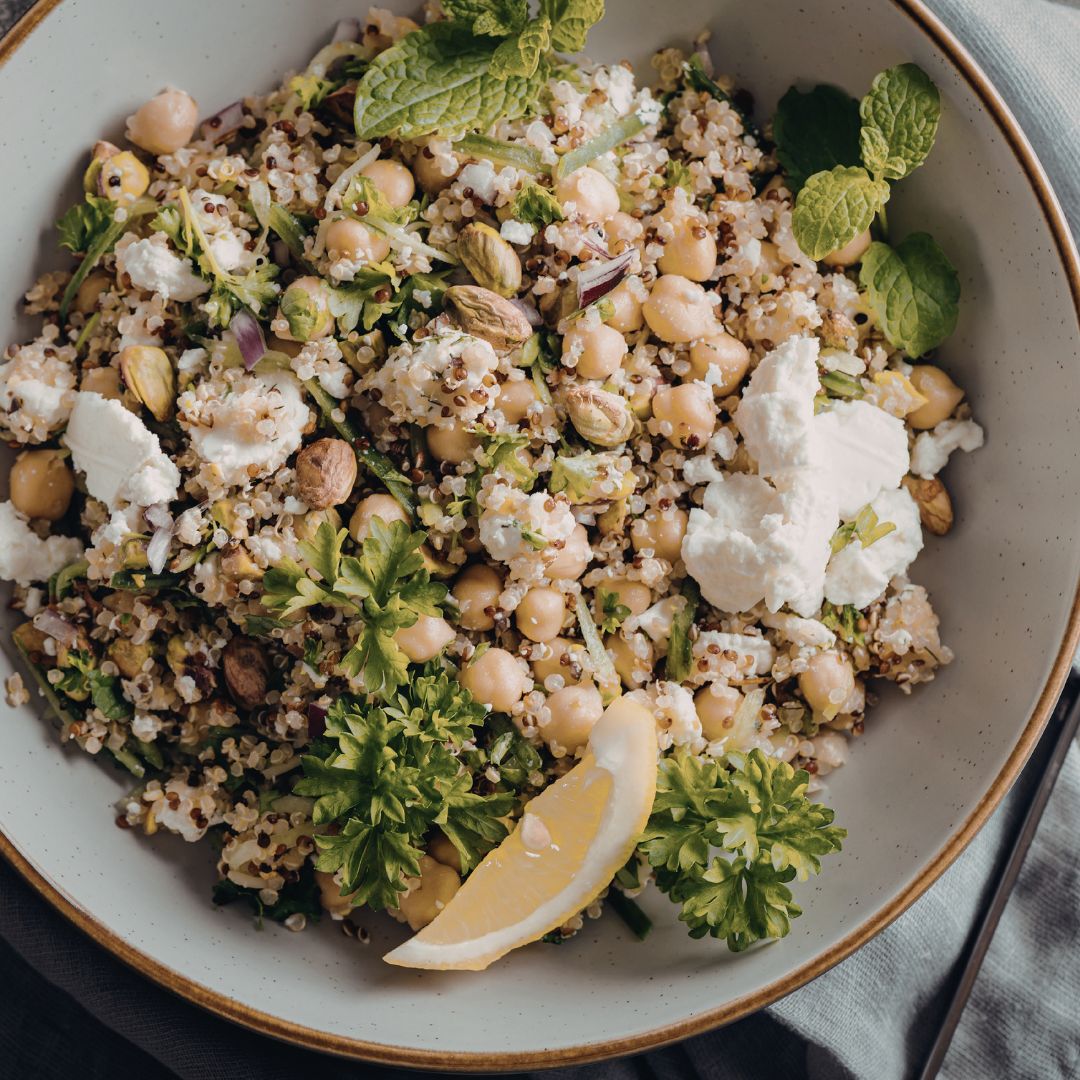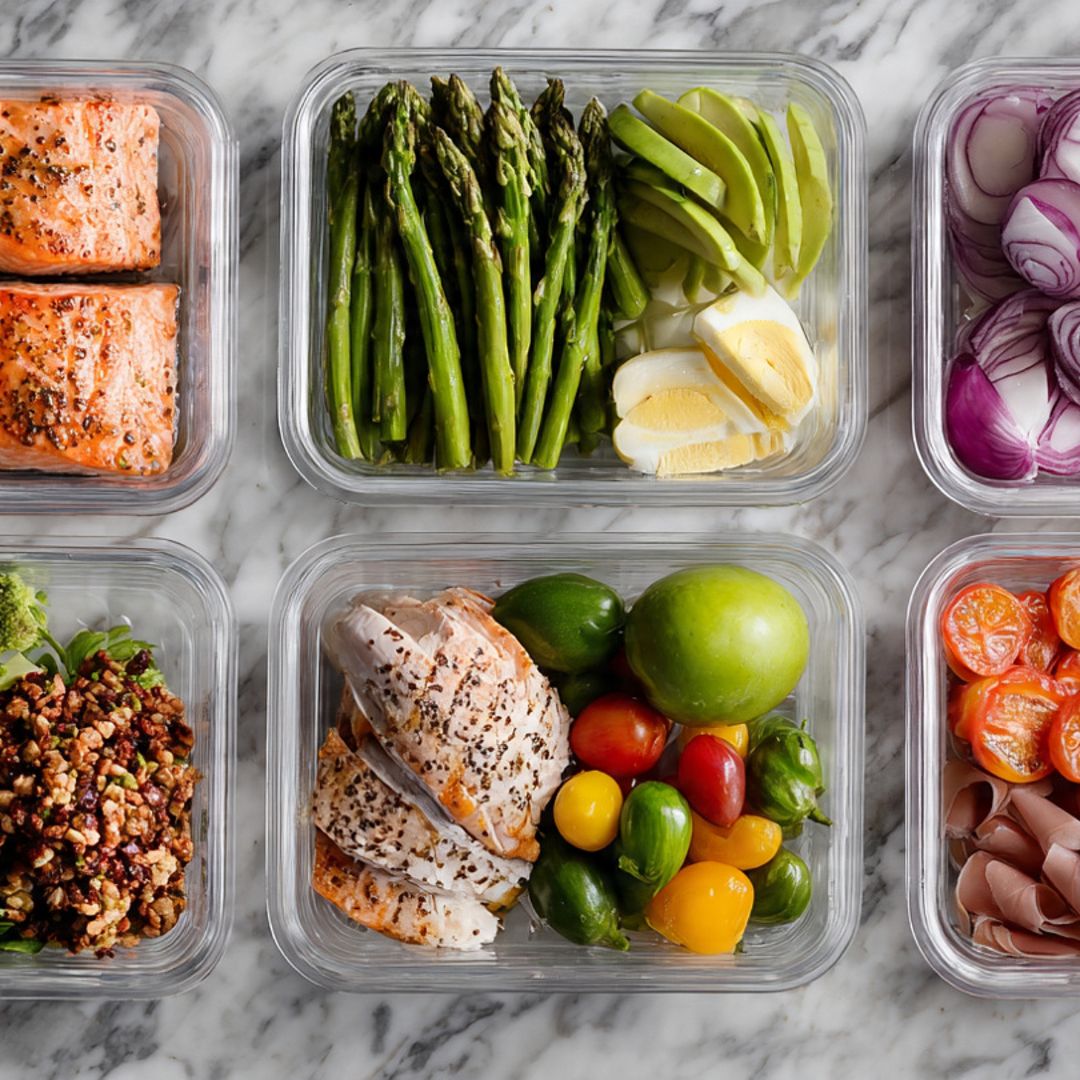![]()
Gut Testing: What’s Worth Doing - and What’s Not
If you’ve been struggling with bloating, irregular bowel habits, IBS-type symptoms or persistent digestive discomfort, it’s natural to start wondering:
Should I get a gut test?
A quick search online brings up everything from microbiome mapping and stool tests to SIBO breath testing, food sensitivity panels and parasite cleanses. It can be hard to know what’s evidence-based, what’s genuinely useful, and what might simply add more confusion (and expense).
In this blog, I’ll walk you through the most common gut tests people ask about, what they can and can’t tell us, and when it’s essential to involve your GP to rule out medical causes.
First: testing should match your symptoms
One of the biggest mistakes I see is people ordering tests before they’ve clarified what they’re trying to understand.
Gut symptoms can be driven by many factors, including:
A sensible testing strategy should always begin with:
For many people, we can make significant progress without extensive testing. But for others, testing can help us build a much more targeted plan.
Comprehensive stool and microbiome testing
One of the most commonly used functional tests is comprehensive stool testing, often referred to as microbiome testing.
A test like Genova GI Effects Stool Test or GI Map can provide insight into:
When this type of test may be useful
In practice, comprehensive stool testing may be worth considering if:
What it can’t do
Microbiome tests are not there to:
However, they can be useful when interpreted in context, particularly when results are combined with symptom patterns, diet quality, lifestyle factors and health history.
SIBO breath testing
SIBO (small intestinal bacterial overgrowth) is one of the most talked-about causes of bloating online. SIBO occurs when bacteria that normally live in the large intestine overgrow in the small intestine.
The most common test is a breath test, typically measuring hydrogen and methane (and sometimes hydrogen sulphide depending on the test available).
When SIBO testing might be appropriate
SIBO testing may be worth considering if there is:
A note on limitations
SIBO is complex. Breath testing has limitations and results need careful interpretation. Not all bloating is SIBO, and it’s common for people to go through multiple restrictive protocols unnecessarily when the driver is something else entirely (for example constipation, stress patterns, or weak digestion).
Asking your GP to test for coeliac disease
This is one of the most important points in the entire gut testing conversation:
If you have ongoing gut symptoms, especially diarrhoea, bloating, persistent fatigue, or nutrient deficiencies, it is sensible to rule out coeliac disease early. NICE guidelines recommend coeliac disease testing in people with persistent unexplained GI symptoms consistent with IBS, among other presentations.
If you suspect coeliac disease, it’s important that you continue eating gluten before testing. If gluten is removed before the blood test, results may become falsely normal.
This is one reason I don’t recommend removing gluten “just in case” without a clear plan, especially if symptoms are significant.
Your GP can arrange coeliac screening blood tests. If positive (or strongly suspected), further medical follow-up is needed.
FIT testing via your GP (especially if there is blood in stool)
If you notice blood in your stool, it’s important to speak to your GP promptly.
Other red flag symptoms include:
A FIT test (faecal immunochemical test) may be used in primary care to help assess the need for further investigation when symptoms suggest possible bowel disease.
This is not something to self-manage with supplements or elimination diets.
Food sensitivity testing: is it worth it?
Food sensitivity testing is often one of the first things people try when gut symptoms don’t improve. It’s understandable, because it feels like it might give a clear list of foods to avoid.
However, this is an area where it’s easy to spend money and end up more confused (and more restricted) than before.
Why food sensitivity tests often “light up”
With ongoing gut issues, especially if the gut lining is irritated or intestinal permeability is increased (sometimes referred to as “leaky gut”), food sensitivity tests can come back with long lists of positives.
This can happen because the immune system is more reactive when the gut barrier is not functioning optimally. In that situation, results can “light up like a Christmas tree” and leave you feeling like you can’t eat anything at all.
The downside
If we remove lots of foods based on a test result without addressing the underlying gut issue, it can lead to:
In clinic, it’s usually better to:

Spring Gut Glow Salad
A fresh, fibre-rich quinoa and chickpea salad with spring vegetables, feta and seeds, designed to gently support digestion and microbiome diversity.
If you’re trying to support your gut health, you’ll often hear advice to “eat more fibre” or “add prebiotics”. But that can feel confusing (and honestly a bit intimidating) if you’re someone who experiences bloating or IBS-type symptoms.
The good news is that gut-friendly eating doesn’t have to involve extreme restriction, expensive supplements, or forcing down foods that don’t agree with you. Often, the most helpful approach is simply to include a variety of plant fibres, introduce them gradually, and build meals that are balanced and satisfying.
This recipe is designed to do exactly that.
It combines several ingredients known to support microbiome diversity and digestive function:
The result is a fresh spring salad that’s colourful, nourishing, and easy to prep ahead - ideal if you’re looking for simple, realistic ways to care for your gut without overcomplicating things.
Serves 3
Ingredients
Dressing
Method
If you’re prone to bloating, IBS-type symptoms, or feel nervous about fibre-rich foods:
Storage & meal prep
If you're interested in further recipes, why not check out the recipe folder?

The Fibre Mistake That’s Making Your Bloating Worse
Many of my clients have been told to cut out fibre due to their IBS symptoms or have gradually whittled down their food options until there’s none left. Fibre can be worrying if you’re bloating.
Fibre is often talked about as a single nutrition target, usually measured in grams. But when it comes to gut health, it isn’t only about how much fibre you eat. It’s also about how many different fibres you include.
Your gut microbiome thrives on variety. Different bacteria prefer different fibres, and the wider the range of plant foods you eat, the more likely you are to support a diverse, resilient microbiome.
Let’s take a look at the different types of fibre, why variety matters, common myths that keep people stuck, and how to build fibre diversity gently - especially if you’re prone to IBS symptoms.
Different Types of Fibre Explained
Fibre is the part of plant foods that the body can’t fully digest. Instead, fibre becomes fuel for gut bacteria and helps support bowel regularity, blood sugar balance and digestive comfort.
But not all fibre behaves the same way.
Soluble fibre
Soluble fibre dissolves in water and forms a gel-like texture in the gut. It can help support:
Sources include oats, chia seeds, flaxseed, beans/lentils, apples, pears, carrots and sweet potato.
Insoluble fibre
Insoluble fibre adds bulk and helps move food through the digestive tract.
Sources include wholegrains, nuts and seeds, skins of fruit/veg, kale, cabbage and green beans.
Some people with IBS symptoms find large amounts of insoluble fibre harder to tolerate, especially during flare-ups. This doesn’t mean insoluble fibre is “bad”, but it does mean the type and timing matters.
Resistant starch
Resistant starch reaches the large intestine intact, where gut bacteria ferment it.
Sources include:
Prebiotic fibres
Prebiotics are specific fibres that feed certain beneficial bacteria.
Sources include onions, garlic, leeks, asparagus, chicory and some wholegrains.
If these trigger bloating, it’s often a sign that your gut needs a gentler approach, not that you need to avoid them forever.
Why Diversity Matters More Than Fibre Counts
It’s easy to think of fibre as something you either “hit” or you don’t. But fibre intake isn’t only a numbers game.
Different fibres create different effects in the gut. They support different bacterial species, and those bacteria produce compounds (such as short-chain fatty acids) that influence gut lining integrity and immune signalling.
This is why fibre diversity can be more meaningful for long-term gut health than simply increasing fibre grams quickly.
A useful goal is to aim for:
This can be done without turning food into a tracking exercise.
If you’d like to understand more about how the microbiome affects whole-body health, you may enjoy my March blog: How Your Gut Microbiome Shapes Hormones and Immunity.
Common Fibre Myths
Myth 1: “If fibre makes me bloated, fibre is the problem.”
Often it’s the speed of increase or the types of fibre being introduced. Rapid changes can increase fermentation quickly, leading to temporary bloating and wind. This is why slow, steady changes tend to work best.
Or it can be a sign that there is an imbalance on the gut microbiome that needs investigating.
Myth 2: “I need lots of raw salads for good gut health.”
Raw veg can be difficult for some people with IBS symptoms. You can support your gut just as effectively with:
In many cases, cooked veg is the most gut-friendly starting point.
Myth 3: “Fibre only matters for constipation.”
Fibre supports far more than gut transit. The microbiome is involved in inflammation regulation, immune resilience and hormone metabolism, which is why gut support can benefit the whole body.
Building Fibre Variety Gently
If you’re prone to bloating or IBS symptoms, the goal is not to overload your gut. The goal is to build tolerance and confidence.
1. Add one new fibre-rich food every few days
For example:
2. Rotate rather than restrict
Keep your staples, but rotate one or two each week:
3. Prioritise soluble fibre first
If your gut is reactive, start with gentler fibres:
4. Use small portions of common triggers
Rather than avoiding foods completely, try micro portions:

Your Gut Called… It Wants You to Stop Ignoring It
If you’ve ever been told that bloating, IBS symptoms or fatigue are “just digestion issues”, you’re not alone. Many clients come to me feeling confused and overwhelmed after receiving restrictive gut advice, unsure what they can eat without triggering symptoms.
The truth is that the gut has roles that go far beyond digestion. Your gut microbiome (the community of microbes living in your digestive tract) helps shape immune function, impacts inflammation, and plays an important role in hormone balance and metabolism.
Let’s explore how gut microbes influence hormones and immunity, and how food can support a healthier, more diverse microbiome without falling into crazy restrictive patterns.
What Is the Gut Microbiome?
Your gut microbiome refers to the trillions of microorganisms living primarily in your large intestine, including bacteria, yeasts and other microbes. Many are beneficial, some are neutral, and a smaller number can be problematic if they overgrow.
A “healthy” microbiome isn’t defined by having one perfect strain of bacteria. Instead, research suggests that microbiome diversity is one of the key features associated with resilience, better gut barrier function and healthier immune responses.
Your microbiome is also constantly changing. It can be influenced by:
So, if you’ve tried multiple gut protocols in the past and still don’t feel better, it doesn’t necessarily mean you’re failing. It may mean that your gut needs a more supportive, sustainable plan.
The Gut–Hormone and Gut–Immune Links
Many people are surprised to learn just how connected the gut is to whole-body health. Your gut microbiome doesn’t work in isolation. It communicates with both the immune system and endocrine system (hormones) via multiple pathways.
Let’s break it all down:
1. Gut microbes help regulate inflammation
A large proportion of the immune system sits around the gut. This makes sense because the gut is one of the biggest points of contact between the outside world and the inside of your body.
When the microbiome becomes less diverse (or more imbalanced), it may contribute to:
This can show up as symptoms that don’t feel gut-related at all, such as skin flare-ups, fatigue, headaches or joint discomfort.
2. The microbiome influences oestrogen balance
The gut plays a role in how oestrogen is processed and eliminated. Certain gut bacteria help break down and re-circulate oestrogen, which means the microbiome can influence overall hormone balance.
If gut transit time is slow (constipation) or the microbiome is imbalanced, this may affect the way hormones are metabolised and cleared, which can contribute to symptoms such as:
Nutrition is not a replacement for medical treatment, but it can be a powerful tool in supporting healthy elimination pathways and overall hormonal resilience.
3. Gut health may influence stress hormones
The microbiome interacts with the brain and nervous system through the gut–brain axis. Some bacteria even produce neurotransmitters and metabolites that influence mood and stress resilience.
This is one reason why people often notice their gut symptoms worsen during stressful life periods, even when their diet hasn’t changed.
Supporting the Microbiome with Food
If you’ve been told you need to cut out gluten, dairy, FODMAP foods and sugar forever to “fix your gut”, it’s understandable you might feel anxious around eating.
While short-term therapeutic approaches can sometimes be useful (and should always be personalised), long-term gut health is rarely about restriction alone.
In clinic, I often focus on rebuilding confidence with food, improving microbiome diversity gradually, and supporting digestion in a way that feels sustainable. (And gut testing can be a part of this – don’t hesitate to contact me if you’d like to know more).
Here are the key nutrition foundations that I use to support microbiome health.
1. Prioritise fibre diversity (not just fibre quantity)
Many people associate fibre with bran cereals and digestive discomfort. But the microbiome thrives on a range of fibres from different plant foods, including:
If you’re prone to bloating or IBS symptoms, this doesn’t mean fibre is “wrong” for you. It may mean you need the right type, dose, and pacing.
A useful goal for many people is aiming for 30 different plant foods per week (including herbs, spices, nuts and seeds) to encourage microbial diversity. This is often a more helpful metric than focusing only on grams.
2. Include fermented foods, if tolerated
Fermented foods can be a helpful way to introduce beneficial microbes, for example:
These foods aren’t suitable for everyone (especially if histamine intolerance is suspected), but for many people they can support microbial variety and gut function.
3. Support gut motility and bowel regularity
Constipation is very common, and it matters for hormone and immune health. Regular bowel movements help reduce the recirculation of metabolic waste, including waste hormones.
Key nutrition supports include:
4. Don’t underestimate blood sugar balance
Unstable blood sugar can contribute to inflammation, stress hormone dysregulation and cravings, which can all indirectly affect the gut.
A simple but powerful strategy is to build meals around:
5. Reduce ultra-processed foods where possible
You don’t need perfection, but research suggests that diets high in ultra-processed foods may negatively impact microbiome diversity and gut barrier function over time.
If this feels daunting, start small. One practical approach is to keep convenience, but upgrade quality, such as:
Gut health isn’t about chasing the “perfect” microbiome. It’s about creating the conditions that allow the gut ecosystem to become more resilient over time.
If you’re dealing with ongoing bloating, IBS symptoms, or you feel stuck after restrictive advice, a personalised approach can help you understand what your gut needs, without unnecessary fear around food.
Ready for personalised support?

Top Tips for Everyday Anti Inflammatory Swaps
When people hear the term “anti-inflammatory diet”, it often sounds overwhelming. Many imagine long lists of foods to avoid, complicated rules, or yet another short-lived reset that does not fit real life.
In practice, the strongest evidence does not support perfection or extreme restriction. Instead, it shows that small, consistent dietary shifts can meaningfully influence inflammatory pathways, particularly when they are sustained over time - and this is what I use in clinic every day.
This blog focuses on everyday food swaps that are realistic, flexible and evidence-based, especially for those of us looking to support heart health alongside inflammation balance.
Why small swaps matter more than perfection
Chronic inflammation develops gradually and is influenced by cumulative exposures rather than single meals. Research consistently shows that overall dietary patterns, not individual “superfoods”, are what shape long-term cardiovascular and inflammatory risk.
From a physiological perspective, small swaps work because they gently shift the balance of fats, fibre, antioxidants and micronutrients that influence immune signalling, gut health, blood sugar stability and vascular function. Over weeks and months, these changes add up.
Importantly, restrictive approaches often backfire. Highly rigid diets increase stress, reduce dietary variety and are difficult to maintain. Stress itself is inflammatory, and overly restrictive eating can paradoxically undermine the very outcomes people are trying to achieve.
The goal is not to eat perfectly, but to tilt the balance in a more anti-inflammatory direction most of the time.
Easy anti-inflammatory changes for everyday meals
Rather than thinking in terms of foods to cut out, it is more helpful to think about what you can swap in.
Swap the main cooking fat most days
One of the most evidence-supported changes is replacing saturated fats with unsaturated fats.
Regular use of inflammatory seed oils, such as vegetable oil or processed sunflower oil may contribute to increased inflammation. Replacing these with extra virgin olive oil has been shown to reduce inflammatory markers and support endothelial function.
Swap refined carbohydrates for fibre-rich options
Refined carbohydrates such as white bread, white rice and many breakfast cereals digest quickly and can contribute to blood sugar fluctuations. These fluctuations are associated with increased inflammatory signalling and higher triglyceride levels.
Swapping to wholegrains where tolerated, or adding fibre-rich foods alongside refined options, helps slow glucose absorption and supports gut-derived anti-inflammatory compounds. Even modest increases in fibre intake have been associated with lower C-reactive protein levels in large cohort studies.
This might look like adding lentils to a pasta dish, choosing nuts and seeds more often at breakfast, or including veggies at meals where they were previously absent.
Swap processed snacks for combinations that stabilise blood sugar
Ultra-processed snacks often combine refined carbohydrates, industrial fats and added sugars. These combinations are strongly associated with higher inflammatory markers and poorer cardiometabolic outcomes.
A useful rule of thumb is to build snacks, when needed, around protein, fibre and healthy fats together. This supports blood sugar stability, which in turn reduces inflammatory stress on the body.
This does not require eliminating convenience foods entirely. It is about shifting the balance so that nutrient-dense options appear more often across the week.
Swap some red and processed meat for plant and fish proteins
High intakes of processed meat are associated with increased cardiovascular risk and higher inflammation. Evidence suggests that replacing some of these foods with plant proteins or fish is associated with lower inflammatory markers and improved heart health outcomes.
Fish provides omega-3 fatty acids, which have modest anti-inflammatory effects and support vascular health. Plant proteins such as beans and lentils also contribute fibre and polyphenols that positively influence the gut–immune axis.
This does not require becoming vegetarian. Even one or two swaps per week can contribute to a lower inflammatory load.
Swap flavourings before cutting salt entirely
Salt reduction can support blood pressure, but food does not need to become bland.
Herbs, spices, garlic, onions and citrus provide flavour while also contributing antioxidant and anti-inflammatory compounds. Diets rich in polyphenols from plant foods are consistently associated with lower inflammation and reduced cardiovascular risk.
Focusing on flavour first often makes it easier to reduce reliance on heavily processed, high-sodium foods without feeling deprived.
Making swaps sustainable
The most effective swaps are the ones you can repeat without thinking too much about them.
It can help to:
If your diet already feels quite good, these swaps are not about “doing more”. They are about fine-tuning in a way that supports inflammation balance alongside heart health.
If you would like more structured support, including practical ideas and recipes, why not join my free private Facebook group: Back to Health with Sarah and Alex – you’ll find heaps of anti-inflammatory recipes you can try.

Omega-3-Rich Mackerel and Beetroot Salad
When it comes to heart health, nutrition does not need to be complicated to be effective. Simple meals built around the right balance of fats, fibre and plant compounds can support cardiovascular health while still feeling enjoyable and realistic.
This omega-3-rich mackerel and beetroot salad is a good example of how everyday ingredients can come together to support heart health and inflammation balance, without relying on ultra-processed foods or lengthy preparation.
Why omega-3 fats support heart health
Omega-3 fatty acids, particularly EPA and DHA found in oily fish, have been widely studied in relation to cardiovascular health. Evidence from recent systematic reviews and large-scale trials suggests that omega-3 intake supports heart health through several complementary mechanisms.
Omega-3 fats help regulate inflammatory signalling pathways and are involved in the production of compounds that support resolution of inflammation. They also play a role in supporting normal triglyceride levels and vascular function.
Mackerel is one of the richest and most affordable sources of omega-3 fats available in the UK. Including oily fish regularly, in line with UK dietary guidance, is consistently associated with improved cardiovascular outcomes within overall dietary patterns such as the Mediterranean diet.
Beetroot complements this by providing dietary nitrate, fibre and polyphenols. Dietary nitrates are converted in the body to nitric oxide, which supports blood vessel function and healthy blood flow. Beetroot fibre also contributes to gut health, which is increasingly recognised as part of the inflammation and heart health picture.
Together, these ingredients create a meal that supports multiple aspects of cardiovascular health in a food-first way.
Mackerel and Beetroot Salad
This recipe works well as a light lunch or as part of a larger meal.
Serves 2
Ingredients:
Method:
Simple variations
This salad is easy to adapt depending on preferences and availability.
If you prefer a warmer dish, the beetroot can be gently warmed before assembling the salad. For extra fibre and texture, you can add cooked lentils or butter beans. If smoked mackerel feels too strong, freshly grilled or poached mackerel works just as well.
For those who do not eat mackerel, sardines or trout provide a similar omega-3 profile and can be used in the same way.
![]()
Please get in touch and find out more - I offer a free 30-minute exploratory call.